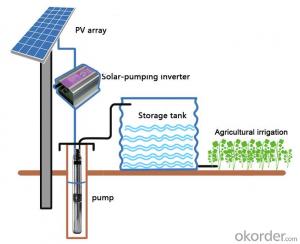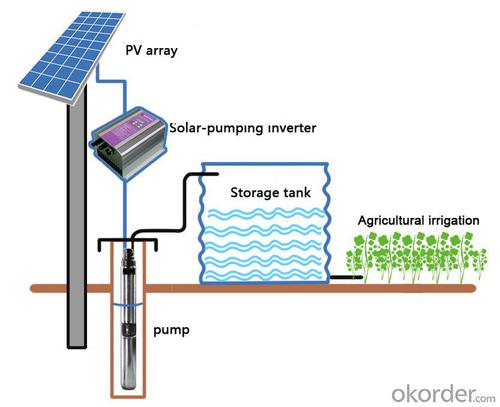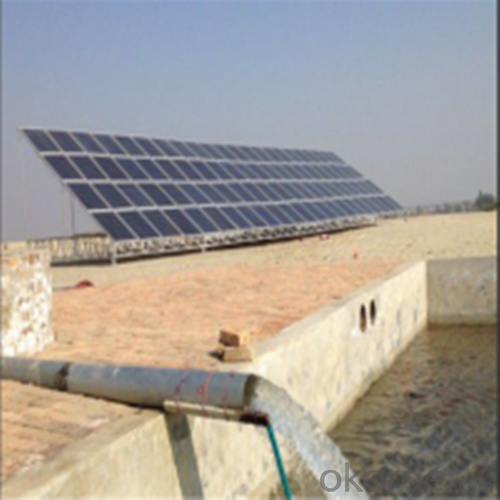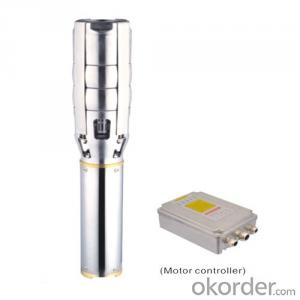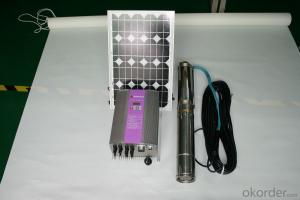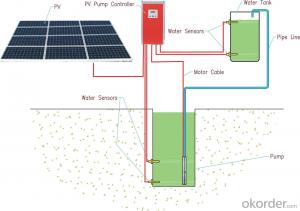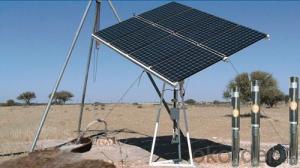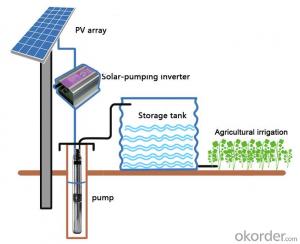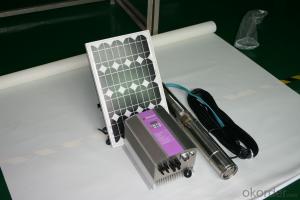10hp Solar Pump - Solar Irrigation Pump with Solar Panel Water Pumps
- Loading Port:
- Shanghai
- Payment Terms:
- TT OR LC
- Min Order Qty:
- 1 set
- Supply Capability:
- 1000 set/month
OKorder Service Pledge
OKorder Financial Service
You Might Also Like
Solar Irrigation Pump Solar Panel Water Pumps
DC solar water pumping system consists of the motor, pump, controller, solar array and some other accessories, such as water level sensor, float switch, etc. Considered that storing water is more efficient than storing electricity, the system is designed to directly drive the pump without battery which can reduce the construction and operating cost and routine maintenance effectively.The PV array consists of multiple solar panels connected in series/parallel, which can supply the whole system as power source by converting the absorbed solar radiation energy to the electrical energy. The pump driven by a brushless DC permanent magnet motor draws water from deep-well or river. The pumped water is then fed into reservoir or water tank, or connected to the irrigation system or fountain system directly.
Advanced Technology
Applications Innovation
The efficiency of DC brushless permanent magnet motor has been increased up to 25% in comparison with traditional asynchronous motor.
Technology Innovation
Stator and rotor are sealed by environment friendly casting resin.Motor insulation resistance can be hold higher than 300MΩfor more than 10 years, which consumedly increased the security and reliability of the submersible motor.
Structure Innovation
Casting resign technology processed stator and rotor as well as the water lubricated bearing make the submersible pump environment friendly.
Feature
High Efficiency & High Reliability
DC Brushless Permanent Magnet Motor
Minimum Maintenance, long Service Life
Environment Friendly Materials, Lubricated Without Oil
Application
Village or Family Water Supply
Animal Drinking Water & Livestock Watering
Garden/Courtyard Irrigation
Swimming Pool
Water Supply for Bivouac or Camping Car
Water Supply for Remote Area
Automatic Control
Operate Automatically, No Need Watching
Maximum Power Point Tracking (MPPT)
Dry-run Protection
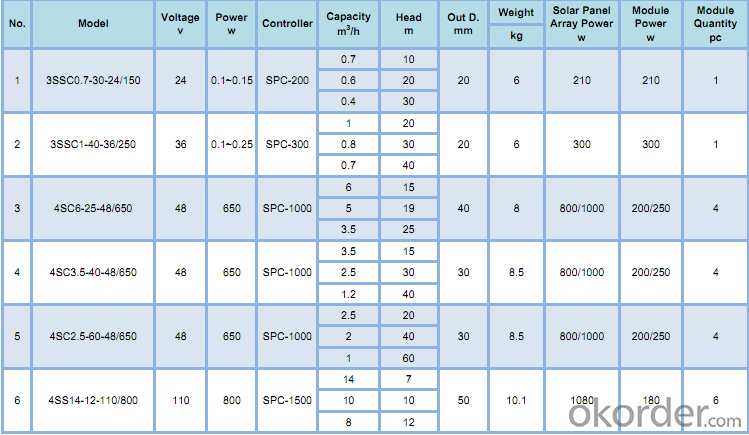
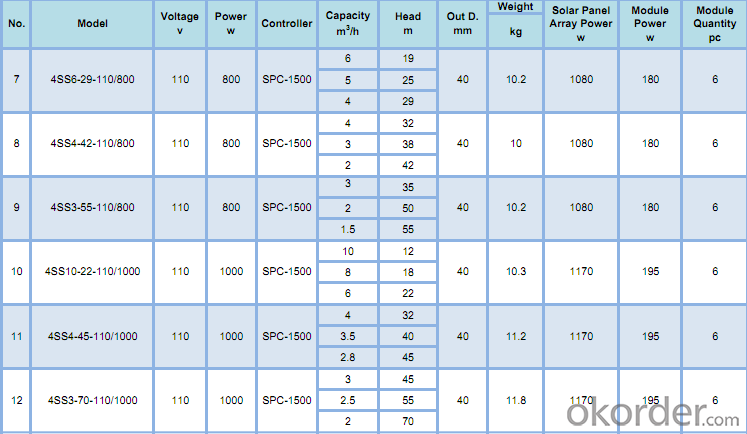
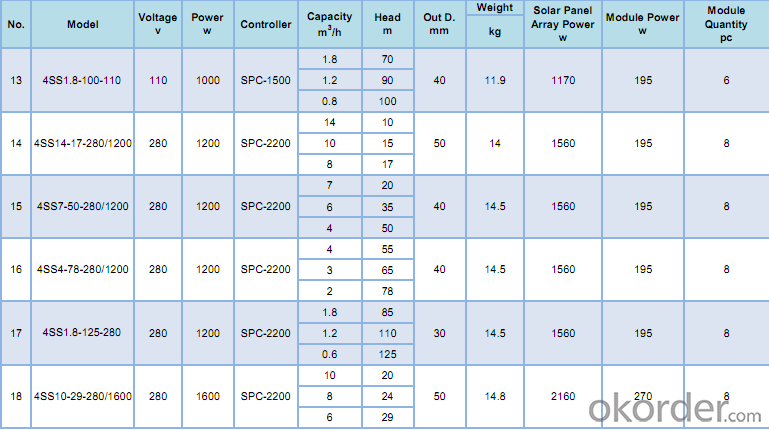
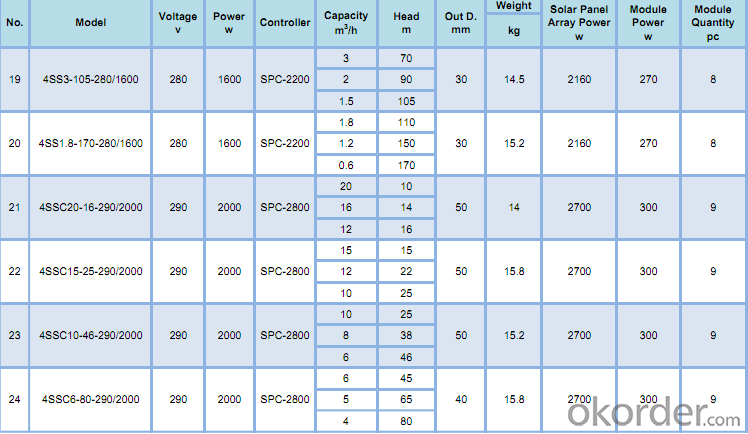
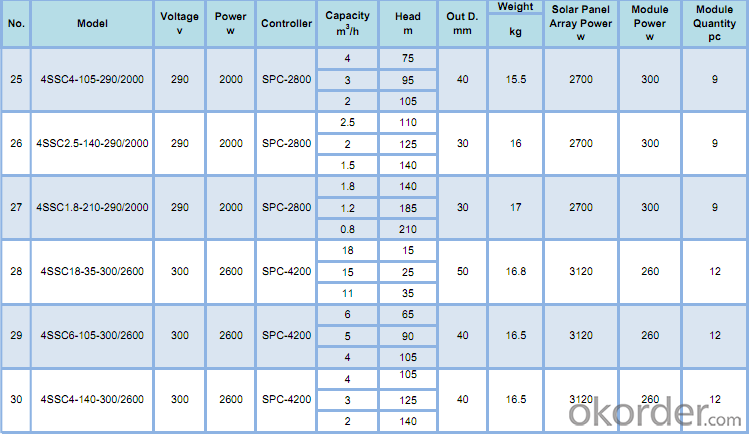
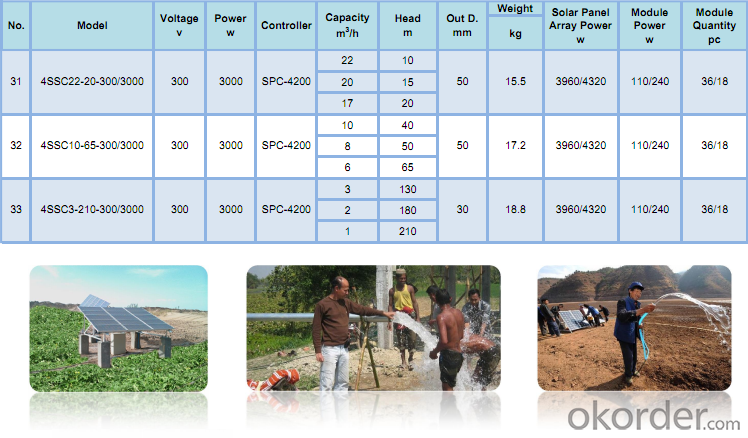
- Q: How does a solar pump help in reducing reliance on diesel generators?
- A solar pump helps in reducing reliance on diesel generators by harnessing solar energy to power the pump instead of relying on fossil fuel-based diesel generators. This not only decreases the need for diesel fuel but also reduces emissions and operating costs associated with running diesel generators. Solar pumps offer a sustainable and environmentally friendly alternative for various applications such as agricultural irrigation, water supply, and livestock watering.
- Q: Can a solar pump be used for water circulation in greenhouses?
- Yes, a solar pump can be used for water circulation in greenhouses. Solar pumps are an eco-friendly and cost-effective solution for circulating water in greenhouses. They utilize solar energy to power the pump, eliminating the need for electricity or fuel. This makes them a sustainable option for greenhouse owners who want to reduce their carbon footprint and save on energy costs. Solar pumps can be used to circulate water for irrigation, cooling, or maintaining humidity levels in the greenhouse. They can be connected to a water source, such as a well or a rainwater harvesting system, and distribute the water to various areas of the greenhouse through a network of pipes or hoses. The water circulation provided by solar pumps helps to evenly distribute nutrients and moisture to the plants, ensuring their optimal growth and health. Additionally, solar pumps can be paired with solar panels to create a self-sufficient and off-grid water circulation system for greenhouses.
- Q: What is the typical power consumption of a solar pump?
- The typical power consumption of a solar pump depends on various factors, such as the size and efficiency of the pump, the amount of sunlight available, and the desired flow rate. However, on average, a small solar pump can consume around 100 to 500 watts, while larger pumps may require several kilowatts of power.
- Q: How does the size of the solar pump controller affect its performance?
- The performance of a solar pump controller can be significantly influenced by its size. The size denotes the controller's capacity or power output, typically measured in watts. A solar pump controller of larger size, boasting a higher power output, can effectively handle larger loads and thus support more robust pumps. This enables it to manage higher flow rates and lift heights, resulting in the pumping of water with greater efficiency. Furthermore, it can accommodate larger solar panels, capable of producing more electricity and recharging batteries at a faster pace. Conversely, a smaller solar pump controller with a lower power output might struggle to cope with high flow rates or lift heights. It may have difficulty powering larger pumps, leading to decreased performance and efficiency. Additionally, a smaller controller may have limited compatibility with solar panels, resulting in slower battery charging and diminished overall performance. Therefore, it is crucial to select the appropriate size for a solar pump controller in order to ensure optimal performance. Factors such as the required flow rate, lift height, and power requirements of the pump must be taken into consideration. By choosing a controller of suitable size, one can maximize the effectiveness and efficiency of the solar pumping system.
- Q: Can a solar pump be connected to a backup battery system?
- Yes, a solar pump can be connected to a backup battery system. This allows the pump to continue operating even when there is no sunlight, ensuring a continuous water supply.
- Q: How does the depth of the water source affect the performance of a solar pump?
- The depth of the water source directly affects the performance of a solar pump. As the depth increases, the pump needs to work harder to lift the water to the surface, resulting in reduced efficiency and lower flow rates. Therefore, the deeper the water source, the more powerful solar pump is required to maintain optimal performance.
- Q: How do solar pumps handle water with low pH or chemical contamination?
- Solar pumps are generally not designed to specifically handle water with low pH or chemical contamination. However, in some cases, additional filtration systems or chemical treatment may be added to the solar pump system to address these issues. It is important to note that the effectiveness of such treatments may vary depending on the extent of the pH or chemical contamination.
- Q: How does the performance of a solar pump vary with different solar panel efficiencies?
- The performance of a solar pump is directly affected by the efficiency of the solar panels used. Higher efficiency solar panels convert more sunlight into electricity, resulting in increased power output for the pump. This means that with higher efficiency panels, the solar pump will be able to generate more water flow, operate at a higher pressure, and potentially work during low light conditions as well. On the other hand, lower efficiency panels would produce less power, resulting in reduced pump performance. Therefore, the performance of a solar pump varies significantly with different solar panel efficiencies.
- Q: Can a solar pump be used in conjunction with a drip irrigation system?
- Yes, a solar pump can be used in conjunction with a drip irrigation system. Solar pumps are capable of providing the necessary water pressure to operate a drip irrigation system effectively. This combination allows for the efficient use of water resources and reduces dependency on traditional energy sources.
- Q: Is it possible to retrofit an existing pump system with solar power?
- Retrofitting an existing pump system with solar power is indeed a possibility. The process involves integrating solar panels and a solar power converter into the system that already exists. To maximize sunlight exposure, the solar panels would typically be installed on the roof or in a nearby area. By connecting the solar power converter to the existing pump system, it becomes possible for the system to draw power from the solar panels. As a result, the pump system can function independently of the electrical grid, potentially eliminating the need for traditional electricity altogether. Retrofitting with solar power offers numerous benefits, including reduced operating costs, lower carbon emissions, and increased energy self-sufficiency. However, it is crucial to consider the specific requirements of the pump system and ensure that the solar power capacity meets its needs.
Send your message to us
10hp Solar Pump - Solar Irrigation Pump with Solar Panel Water Pumps
- Loading Port:
- Shanghai
- Payment Terms:
- TT OR LC
- Min Order Qty:
- 1 set
- Supply Capability:
- 1000 set/month
OKorder Service Pledge
OKorder Financial Service
Similar products
Hot products
Hot Searches
Related keywords
